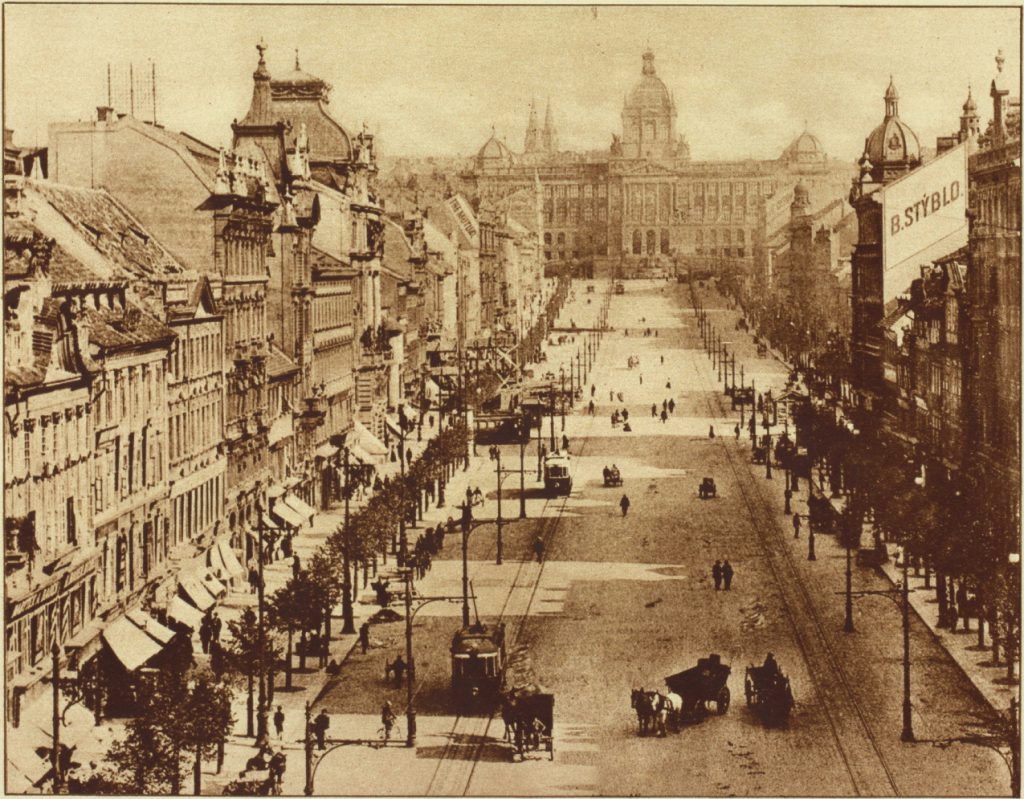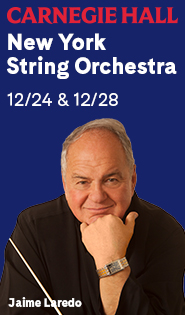Botstein, ASO visit early 20th-century Prague

Wenceslaus Square, Prague, c. 1910
The Czech lands of Bohemia and Moravia have historically been both a place apart and a cultural crossroads of Europe, which is why “Prague Central” was the title of the American Symphony Orchestra’s program of music by early-20th-century Czech composers, performed Friday night in Carnegie Hall.
The names of Novák, Suk, Martinů and Schulhoff don’t trip off the tongues of most concertgoers. Suk and Schulhoff are remembered partly for extramusical reasons, as Dvořák’s son-in-law and a victim of the Holocaust respectively. Martinů’s music enjoyed a substantial reputation in the U.S. at mid-century and still has its champions.
But taken together, Friday’s performances of works by these composers, led by the ASO’s music director Leon Botstein, offered revealing glimpses of the artistic ferment of a turbulent time, as filtered through the sensibility that gave the world Franz Kafka and Cubism.
Vítězslav Novák was a prolific and influential composer who, if one is to believe Michael Beckerman’s informative program note, managed the feat of being “claimed by both modernists and neo-romantics as a founding figure.” Does this make Novák a Czech Richard Strauss, and his tone poem In the Tatras a sort of “Alpine Symphony” of the eponymous Slovakian mountain range?
On the evidence of Friday’s concert, Novák, though a real-life mountaineer himself, was no Strauss when it came to orchestral scene-painting. (We don’t know for sure, but it would be like Strauss to hear Novak’s piece, composed a decade earlier, and decide he could do it better.) The Czech composer’s love affair with the sound of the full orchestra had everybody playing all the time instead of focusing on particular effects. Every folk-like theme was bundled in luscious strings and glowing brass as it climbed slowly up the crescendo toward the summit, each peak higher than the last, buffeted by shrieking winds in the piccolo.
It came as a relief when at last the orchestra players dropped out one by one, leaving only muted strings and harp to contemplate the mountain sunset.
When he arrived in the U.S. as a war refugee in 1941, Bohuslav Martinů found a brisk market here in symphonies, a genre he hadn’t cultivated before. He obligingly composed five symphonies between 1942 and 1946, of which the Third was performed Friday.
Serge Koussevitzky, the tireless advocate of new symphonies by Americans such as Roy Harris, William Schuman, and Walter Piston, premiered this work with the Boston Symphony Orchestra in October 1945. But Friday’s performance revealed a piece that didn’t aim for that American big-sky sound, cultivating instead a rhetoric of small gestures, melodic cells of Czech shape put through constant rhythmic variation.
This style may have referred back to the neo-Baroque idiom of earlier Martinů works, but hearing it after Novák’s mountain majesties, the effect was claustrophobic, even Kafkaesque. The Largo second movement opened things up a bit, mounting slow crescendos over a steady quarter-note pulse and even breaking into a folksong-like melody for a few bars before a dissonant fog rose again to obscure all.
The symphony’s finale put a twitchy energy under more tunes of narrow compass, generating interest mainly by building up and thinning out the orchestral texture. Toward the close, the tempo slowed and the music broadened into a Coplandesque vista or two, but Martinů put a stop to that with three enigmatic cluster chords on the piano to close the piece.
Josef Suk was a Czech shape-shifter, represented in the repertoire today by charming chamber music and a String Serenade on one hand and his impassioned, Mahlerian Asrael Symphony on the other. The date of Friday’s Scherzo fantastique, 1903, places it early in Suk’s output.
The title denotes a lively piece that’s free to follow its inspiration wherever it leads, and Suk seemed caught up in a dream sequence made of fragments of his father-in-law’s Slavonic Dances, taking them places harmonically that the elder Dvořák would never dare. A smooth, hummable Czech tune wandered among the jittery, syncopated motives in a mostly attenuated texture of woodwind colors, string tremolos, and flecks of brass. Although Botstein’s matter-of-fact direction left some of Suk’s whimsy on the table, the music did bloom nicely into full Dvořákian orchestral sound when the composer allowed it to.
After an early career as a musical trickster and jazz lover with Dada tendencies, Ervin Schulhoff underwent a musical personality change in the early 1930’s, when he became an ardent devotee of communism. Composed in 1938-39 and not performed in the composer’s lifetime, the Fifth Symphony is imbued with a sense of large events, giving it more kinship with broad-shouldered Americans like Harris and Schuman—and particularly with the Shostakovich of the Fifth and the “Leningrad” symphonies– than with his countryman Martinů.
In Friday’s vivid performance, the symphony was framed by two marches, the first brutal and arrogant in character, the finale bubbling with hopeful ferment. The shackles-to-liberation narrative continued in the second movement with a foot-dragging march amid bluesy harmonies, punctuated with the chopped-off phrases of a work song.
The scherzo was an explosion of energy, with the full orchestra from bass drum to piccolo pounding out the driving rhythm. The finale was perhaps a little overlong, with Schulhoff so delighted with the people’s rising up that he enacted it again and again, in crescendo after crescendo.
In any case, this escape from Kafkaesque visions and agitated dreams into the sunshine of socialist realism went over well with the audience, which rose and applauded Botstein and his players for a musical tour well guided.
The next performance of the American Symphony Orchestra will be Elgar’s oratorio The Apostles, May 12 at Carnegie Hall. americansymphony.org; 212-868-9276.

Posted Feb 12, 2017 at 4:01 pm by Wienke
I’m glad someone is reviewing the ASO’s wonderful programs. I did not find the Martinu claustrophobic. The 3rd symp was less burbly than the pieces of his I know. It was gentler, more subdued. But although Martinu did entertain Kakaesque themes, he always seems essentially good humored to me.
As for Mr. Wright’s favorite, I am not fond of military music and I found the Schulhoff a long slog–but it is always good to hear something different, and to hear pieces which are not necessarily masterworks. There is a place for smaller efforts in the arts. It would be a relief to give 19th C lionism a rest.